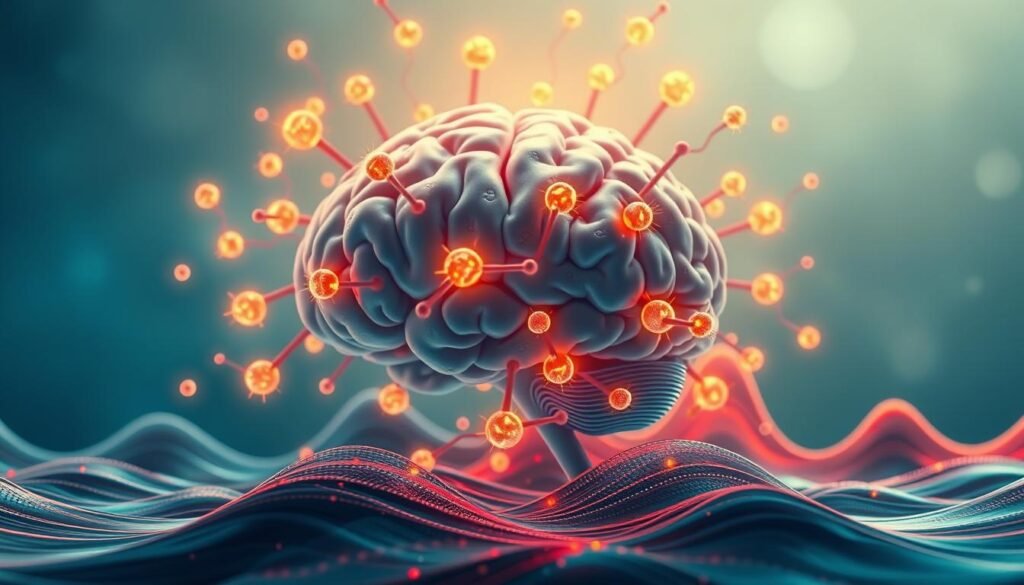Did you know up to 40% of people using SSRIs don’t get better? SSRIs are medications used for anxiety disorders. This fact shows the complex link between serotonin and anxiety. Serotonin is a brain chemical that helps control our mood. In anxiety disorders, it plays a big role. Some research shows that serotonin levels and how it works can differ in people with anxiety. This makes traditional treatments less effective. Understanding how serotonin affects anxiety can help us find better ways to treat it.
Key Takeaways
- Serotonin plays a vital role in mood regulation and is intricately linked to anxiety disorders.
- Research indicates that serotonin levels can differ significantly among individuals with anxiety.
- Up to 40% of patients on SSRIs may not experience the expected relief from their anxiety symptoms.
- The complexity of serotonin effects illustrates why treatment responses to SSRIs vary widely.
- Understanding the serotonin-anxiety connection could inform more effective treatment strategies.
The Role of Serotonin in the Brain
Serotonin is crucial in the brain, affecting mood and anxiety. It activates brain circuits important for our emotional response. These circuits can either reduce or increase anxiety, depending on several factors.
Studies highlight the importance of serotonin creation for brain health. Low serotonin can lead to cognitive issues. For example, it can harm learning and memory, showing how vital it is for managing anxiety.
Research into serotonin sheds light on its role in complex brain functions. It does more than just mood regulation; it affects thinking and reduces anxiety. More serotonin activity can improve mood and brain function.
Serotonin is also key in tackling depression, a major global issue. It impacts areas of the brain linked with learning. Thus, serotonin affects not just our emotions but our overall mental ability.
| Aspect | Serotonin Role | Impacts of Imbalance |
|---|---|---|
| Mood Regulation | Determinant in stabilizing mood | Can lead to depression and anxiety |
| Cognitive Functioning | Enhances learning and memory | Impairment in focus and memory retention |
| Appetite Control | Signals fullness and normalizes eating | Could lead to appetite loss or overeating |
| Sleep Quality | Regulates sleep-wake cycles | Disrupted sleep patterns |
To wrap it up, learning about serotonin helps us understand its role in health. It helps us see how serotonin and anxiety are linked. By understanding its synthesis and impacts, we can advance in mental health knowledge.
Understanding Anxiety Disorders
Anxiety disorders include various mental health issues with intense fear and worry. They disrupt everyday life a lot. The link between serotonin levels and these disorders is fascinating. Some studies show low serotonin might cause these problems. Others say certain anxiety disorders could increase serotonin levels. This shows we need a good balance of neurotransmitters for treatment to work.
Having high trait anxiety is linked with changes in how we control our emotions. This raises the chances of getting anxiety disorders and depression. Brain differences related to serotonin can make some more likely to get these issues. For example, certain parts of the brain showing more serotonin activity can lead to more anxiety.
Drugs like citalopram work by keeping serotonin in the brain’s amygdala longer. This helps lessen anxiety by balancing neurotransmitter levels. Research also points out women might start life with less serotonin than men. This could make them more prone to anxiety issues.
A summary of key factors influencing anxiety disorders and serotonin levels is provided in the following table:
| Factor | Description |
|---|---|
| Serotonin Levels | Low serotonin levels can contribute to symptoms of anxiety, while some may have elevated levels in certain anxiety conditions. |
| Genetic Vulnerability | Serotonin-related gene expression can influence susceptibility to anxiety disorders. |
| Gender Differences | Women are more likely to experience lower serotonin levels, increasing their risk for anxiety disorders. |
| Treatment Options | SSRIs can help regulate serotonin levels, impacting anxiety-like behavior effectively. |
| Behavioral Indicators | Anxiety-like behavior includes avoidance tendencies and physiological responses such as muscle tension and excessive worrying. |
To manage it effectively, we need to look at serotonin levels and neurotransmitter imbalances. Diet changes, exercising, and anxiety meds are ways to seek balance. For more on how serotonin and anxiety are connected, treatments, and how to spot it, check out this resource.

Serotonin and Anxiety: The Connection Explained
Serotonin and anxiety are closely connected. This link shows how important neurotransmitters are for mental health. The body’s serotonin levels help control our mood. When these levels change, our emotions can too. This might look like different symptoms of anxiety.
Studies on selective serotonin reuptake inhibitors (SSRIs) show how they affect serotonin. SSRI treatments like citalopram are used for anxiety disorders. A study with twenty-one healthy people took a closer look. They took 20 mg of citalopram. This showed how serotonin changes affect our brain’s response to anxiety.
After taking citalopram, some brain paths linked to internal feelings worked differently. This might make anxiety worse at first when starting SSRIs. But over time, SSRIs can really help manage mood. They make emotional health better for many people.
A lot of our body’s serotonin is found in the gut. So, gut health is super important for managing serotonin and anxiety. Knowing about this helps us understand and treat anxiety better. To learn more about serotonin’s effect on mental health, explore more about serotonin.
How SSRIs Affect Serotonin Levels and Anxiety Symptoms
Selective serotonin reuptake inhibitors (SSRIs) are key in treating anxiety. They target serotonin in the brain to ease anxiety symptoms. Medications like Citalopram, Escitalopram, Fluoxetine, Paroxetine, and Sertraline are popular. They’re FDA approved for more than just depression. By boosting serotonin, they help brain cells communicate better, easing anxiety and lifting mood.
Mechanism of Action of Selective Serotonin Reuptake Inhibitors (SSRIs)
SSRIs work by blocking the serotonin transporter in the brain. This increases serotonin in the spaces between neurons. More serotonin means better mood and less anxiety. SSRIs are good because they specifically target serotonin without affecting other systems much.
Initial Anxiety Increase with SSRIs
SSRIs are usually safe, but some might feel more anxious at first. This is because serotonin affects many brain areas. The anxiety might go up before it gets better. Knowing this helps patients and doctors work together at the start.

Serotonin Deficiency and Its Impacts on Mood Regulation
Serotonin deficiency can deeply affect mood regulation. It leads to various psychological problems, like more risk of anxiety disorders. Conditions like depression and anxiety have been linked to low serotonin activity. This also includes behavioral issues that distress daily life.
People with low serotonin often report many symptoms. These can be mood changes, sleep problems, and stomach issues. They might feel depressed or anxious, see changes in appetite or pain, and have trouble moving. These issues make it hard to manage mental health. Besides mood, serotonin affects blood clotting, wound healing, and bone health.
Treatment for serotonin levels may include medicines that increase its activity. SSRIs, SNRIs, and MAOIs are options. Drugs such as fluoxetine (Prozac) and sertraline (Zoloft) target this brain chemical. Yet, lifestyle changes also help. This includes therapy, managing stress, light treatment, exercising, and eating well.
Estrogen levels in women also impact serotonin production and use. Symptoms of low serotonin can vary. Signs like constant depression, anxiety, and other issues need a doctor’s check. Seeking advice helps people find the right treatment and see how serotonin and anxiety disorders connect.

Low serotonin levels are linked to many mental and emotional issues. This includes OCD, panic attacks, and PTSD. Serotonin deficiency also affects physical health, leading to obesity, diabetes, heart problems, and stomach issues like irritable bowel syndrome.
It’s key to treat serotonin deficiency to improve mood and lessen anxiety disorders symptoms. For more about managing anxiety and understanding medication, check out this resource.
Neurotransmitter Imbalance in Anxiety Disorders
It’s important to understand how neurotransmitter imbalances affect anxiety. These imbalances, especially in serotonin and others like norepinephrine and dopamine, matter a lot for our emotions. If serotonin levels get messed up, people can feel more anxious or have mood problems.
Identifying Neurotransmitter Imbalances
Finding neurotransmitter imbalances can be tricky. Most tests mainly look at serotonin but miss other key players in anxiety. Important neurotransmitters include:
| Neurotransmitter | Role in Anxiety Disorders | Observations |
|---|---|---|
| Serotonin (5-HT) | Regulates mood and anxiety levels | Low levels can lead to increased anxiety |
| Norepinephrine (NE) | Affects arousal and stress response | Imbalances may enhance anxiety symptoms |
| Dopamine (DA) | Linked to reward processing and emotional regulation | Altered levels can influence anxiety and mood |
| Corticotropin-releasing factor (CRF) | Involved in the stress response | Elevated in major anxiety-related disorders |
| Oxytocin (OT) | Plays a role in social bonding | Associated with emotional responses and depression |
| Neuropeptide Y (NPY) | Modulates behavior during stress | Low plasma levels present in depressed patients |
These neurotransmitters work together in complex ways. This means anxiety could come from many imbalances. Research shows the brain’s amygdala plays a role in how we respond to stress and anxiety. People with anxiety often have a more active amygdala, making them react more to threats.
Behavioral and Physical Symptoms of Anxiety
Anxiety involves various symptoms that can change how a person lives. It’s key to know these symptoms to manage them well. Anxiety can lead to mental and physical problems. By understanding these issues, people can handle anxiety better and improve their lives.
Common Anxiety Symptoms
Anxiety can cause many behaviors. Some common ones are:
- Excessive worrying: Always being concerned about everyday things and what will happen later.
- Irritability: Getting upset easily due to stress, resulting in anger.
- Panic attacks: Feeling extremely scared suddenly, with a body reaction.
- Avoidance behaviors: Staying away from places or events that make anxiety worse, like parties or speaking publicly.
Physical Manifestations of Anxiety
Anxiety also shows up physically, affecting day-to-day life. Some examples are:
- Increased heart rate: Feeling your heart beat fast without doing physical activities.
- Gastrointestinal issues: Having an upset stomach, swollen belly, or diarrhea when stressed.
- Chronic fatigue: Feeling tired all the time because of the stress anxiety causes.
- Tense muscles: Muscles feel stiff and sore from being anxious for too long.
- Difficulty concentrating: Finding it hard to focus, leading to less work done.
Knowing both behavioral and physical symptoms is key to spotting anxiety disorders. Realizing this helps people get the right help and therapy they need to deal with anxiety.
| Type of Anxiety Disorder | Common Symptoms |
|---|---|
| Panic Disorder | Intense fear, panic attacks, heart palpitations |
| Post-Traumatic Stress Disorder (PTSD) | Flashbacks, avoidance of triggers, heightened startle response |
| Social Anxiety Disorder | Fear of judgment, avoiding social places, sweating |
| Generalized Anxiety Disorder (GAD) | Constant worry, feeling on edge, sleeping issues |
Treatment Approaches Beyond SSRIs
Anxiety disorders are a big challenge in the U.S., affecting millions. SSRI medications are often used first. But there are many other treatments that can help people. These alternatives can make care more personal and improve results.
Exploring Anxiolytic Medications
Anxiolytic drugs, like benzodiazepines, work fast to reduce anxiety. Doctors may prescribe them for short periods because they can be addictive. Lorazepam and diazepam are common examples. They are helpful at first, but using them for too long has risks. So, treatment plans might use them for a while, then focus on long-term methods to fight anxiety.
Alternative Therapies for Anxiety Management
Alternative therapies are becoming popular for managing anxiety over time. Practices such as mindfulness, yoga, and CBT help people control their symptoms better. Adding these activities to everyday life can really help mental health. Plus, making lifestyle changes like exercising more and eating well boosts the benefits. Using tools like effective anxiety tools can make management easier.
| Treatment Approach | Pros | Cons |
|---|---|---|
| Anxiolytic Medications | Quick relief of symptoms | Potential for dependence |
| Cognitive Behavioral Therapy (CBT) | Teaches coping strategies | Time-intensive commitment |
| Mindfulness Meditation | Reduces stress and enhances focus | Requires practice and patience |
| Yoga | Promotes relaxation and physical health | Access to classes may vary |
Conclusion
The link between serotonin and anxiety gives us deep insights into the challenges of anxiety disorders. Anxiety affects many people, changing how they live. By understanding how serotonin helps control mood, we can find better ways to treat these issues.
Recent studies show new paths to increase how well treatments work. This includes using natural therapies with usual drug treatments. SSRIs are key in treating conditions like PTSD. They can make anxiety worse at first but better after more time. Still, we must think carefully about how serotonin works and its long-term effects on mood.
New research on serotonin receptors is improving our knowledge. It shows different ways serotonin impacts anxiety disorders. For an in-depth look at this connection and treatment implications, you can read more in neuroimaging studies. With a detailed understanding of serotonin and anxiety, we can help people live better lives.